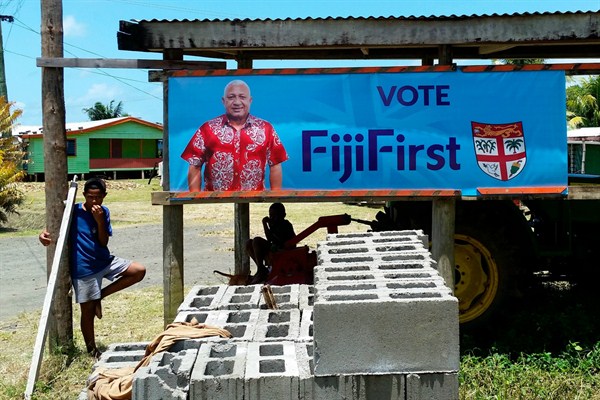Prime Minister Frank Bainimarama of Fiji narrowly won a second term in an election last month that pitted two former coup leaders against each other. Bainimarama has ruled the Pacific island nation since taking power in a bloodless coup in 2006, but his FijiFirst party will now have to contend with stiffer resistance from the main opposition Social and Democratic Liberal Party, which strengthened its position in Parliament in the Nov. 14 vote. In an email interview with WPR, Jon Fraenkel, a professor of comparative politics at Victoria University of Wellington, discusses the results in the context of the Pacific island nation’s demographic fault lines and the regional rivalry between China and Fiji’s traditional allies, Australia and New Zealand.
World Politics Review: What were the key issues motivating voters in November’s election, and how did they help Bainimarama win a second term?
Jon Fraenkel: Issues were important in Fiji’s election, but they were shaped by the country’s ethnic and demographic context. Bainimarama’s FijiFirst party defended the government’s record in supposedly ridding Fiji of the ethnic tensions that provoked coups in 1987 and 2000. The main opposition Social and Democratic Liberal Party, or Sodelpa, emphasized indigenous rights, challenging the government’s abolition of the Great Council of Chiefs and its decision to change the official description of indigenous people from “Fijian” to “Taukei,” a Fijian word meaning “people of the land.” Ethnic Fijians who back Sodelpa fear being marginalized in their own land, like aborigines in Australia or Maori in New Zealand. They also want the Great Council of Chiefs—which once had the power to appoint Fiji’s president, vice president and a majority of the now-defunct Senate—restored as the country’s preeminent indigenous institution.

